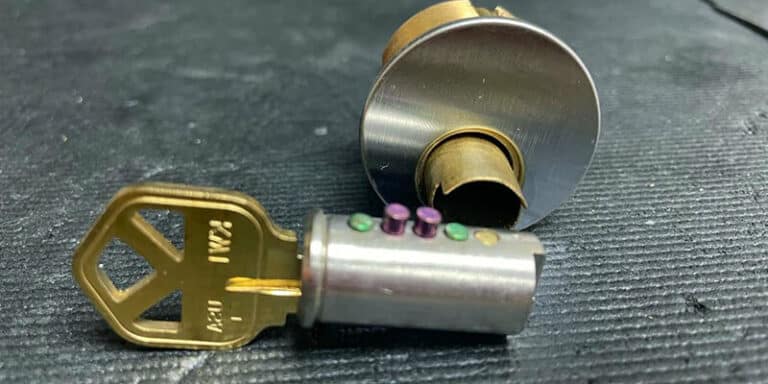Rekeying your own locks can be done for those with skills, patience, and tools. It involves disassembling the lock cylinder, removing the old pins, and replacing them with new ones to match a different key. While DIY rekeying kits are available, the process can be complex and requires precision to ensure the lock functions properly. It’s important to pay attention to detailed directions and possess a solid understanding of lock mechanisms.
However, for most people, especially those without locksmithing experience, it’s often safer and more efficient to hire a professional locksmith to rekey locks to ensure the job is done correctly and securely.
In this article you should expect the following;
- What Is Rekeying A Lock?
- The Benefits of Rekeying Your Own Locks
- When Should You Rekey Your Locks?
- Understanding The Rekeying Process
- Tools Needed For Rekeying
- Step-by-Step Guide To Rekeying Your Own Locks
- Common Mistakes To Avoid
- Is Rekeying Your Own Lock Right For You?
- The Cost Savings
What is rekeying a lock?
Before we dive into the process of rekeying your own locks, let’s first understand what it means. Rekeying a lock involves changing the internal pins or tumblers of the lock cylinder so that a different key can operate it. It basically means that you may use a new set of keys without having to replace the complete lock, and it makes the old keys unusable.
The Benefits of Rekeying Your Own Locks
There are several benefits to rekeying your own locks. Primarily, this provides an additional level of security for your home. When you change the internal parts of the lock, you mitigate danger where anyone with a lost or stolen key could enter into your property. Also, when you consider hiring expert locksmiths for such services, doing it yourself saves money in terms of expenses incurred. With some knowledge and proper tools, many locks within your house can be rekeyed at a fraction of the price.
When should you rekey your own locks?
Many situations will force you into having self-rekeyed locks as the best option to take. If there is relocation from one house to another one, then immediately after arrival at new premises doors must be rekeyed too. One never knows if someone else has copies (or even retains them) from prior owner’s days; conversely, if somebody recently broke into your place or due to misplacement of keys which have never been found yet, thus maintaining tight security within the residential area necessitates immediate replacement on these doors’ locking mechanism as well over again although infrequent ones are also recommended by professional and experienced people like locksmiths Wilmington DE.
Understanding The Rekeying Process
Now that we have looked at why and where replacing our own door locks comes in handy just look inside the Re-keying process itself. To re-key a lock disassembling its cylinder must be done: remove existing pins or tumblers and replace them with others that correspond with different keys. Although it may be difficult, this can be overcome with ease if one has the right tools and the step-by-step procedure.
Tools Needed For Rekeying Your Own Locks
To successfully rekey your locks, you’ll require a few essential tools such as a plug follower, pinning tweezers, a pinning tray, new key pins, new springs, and a cylinder removal tool. The cylinder removal tool is used to disassemble the lock and access the pins while the plug follower is used to remove the plug from the cylinder without losing any of the pins. On the other hand, pinning tweezers along with pinning trays help in manipulating or even organizing pins during the rekeying process. Any existing key must therefore have its key pins and springs replaced with new ones to allow smooth movement of a new key when operating the locking system. Finally, you will need a cylinder removal tool to take apart the lock so that you can reach inside where these ‘pins’ are usually found.
Rekeying Your Own Locks (Step-by-step Guide)
Now let us go through each step of rekeying our door locks since you have all the needed equipment;
1. Get your tools together and establish what type of lock cylinder you own.
2. Remove the lock from the door and dismantle the cylinder using the rotation tool for cylinders.
3. Use a plug follower to extract the plug from within the cylinder but ensure that no displacement happens on pins whatsoever.
4. Empty present pins as well as springs on top of pinning trays.
5. Place new keys into plugs aligning them respectively with their chambers.
6. Deliberately insert fresh springs together with pins according to what the producer says.
7. To reassemble the lock cylinder and stick it back on into the door.
8. Test the lock using the new key to make sure that it works smoothly.
Mistakes You Should Avoid When Rekeying Locks
However, rekeying your own locks is an easy process; there are some common mistakes to avoid. One of them is swapping around pin order or springs resulting in a lock that will not work properly. Each pin and spring must be inserted according to its size and orientation as they enter the chambers. The other one is when you don’t line up all of your key pins with their respective chambers tightly enough so that your lock doesn’t turn freely. Take time to double-check your work to avoid such missteps.
Is Rekeying Your Own Lock Right For You?
Rekeying your own locks takes patience, attention to detail, and basic mechanical skills. If you love doing things yourself or saving money on these projects, this can be quite interesting. However, if you have complicated lock systems or are not comfortable with tools it might be best to hire a professional locksmith instead of attempting this yourself. Consider how difficult your current situation is and what expertise level you already possess before deciding whether or not you want to re-key the locks by yourself.
The Cost Savings of Rekeying Your Own Lock
One of the most important advantages of re-keying your own locks is cost savings. Hiring a locksmith can be quite costly especially if you have several locks requiring re-keying. You can save too much by doing it on your own self. Additionally, the tools needed for rekeying are relatively cheap and can be reused for future projects as well as others that may come later in life eventually helping parents teach their children new skills from scratch over many years at different stages including adulthood thus preparing them both emotionally together with mentally throughout childhood where everything seems fun yet challenging enough “when done right!” It will be worthwhile to invest the time to learn how to rekey locks now because you will be able to do it yourself whenever necessary.
Conclusion
Rekeying your own locks is a great way to achieve home security at an affordable price. By understanding how the process of rekeying works, collecting the necessary tools, and following a step-by-step guide, you can rekey your locks successfully and this will give you peace of mind since you control who accesses your property. Remember also not to make common mistakes, determine if it’s within your comfort zone, and consider whether the lock’s complexity makes it worth saving some money by doing it yourself. With a little effort on your part, the riddles behind rekeying your own locks become no more and give you a good knowledge about securing one’s house.
Frequently Asked Questions
1. Can I do any kind of lock rekeying alone?
Although the majority of standard residential door locks can be done by homeowners, certain high-security or complex locking systems may require the services of a professional locksmith.
2. How long does it take to rekey a lock?
The duration that one may take while rekeying a lock depends on how much he has mastered the process as well as the number of different places keys are required. For example, with enough practice in this area, one could change just one door which usually takes between ten minutes and 30 minutes according to how difficult it is too often reach its middle part inside without removing anything else at all!
3. Do I need any prior experience to rekey my own locks?
Previous experience can be beneficial in operating from scratch, as it allows for the learning of skills through patience and practice. With a single guidebook, anyone can equip themselves to install new types of doors skillfully, securing vulnerable homes against unlocking.
4. What if I don’t have the original keys, can I re-key my locks?
Of course, it is an excellent possibility to rekey Your locks where you have lost the original keys. By doing so, you prevent others from using lost keys on your locks, as they won’t fit and only you can open them with a new set of keys.
5. How secure is rekeying compared with replacing all of the locks?
Rekeying is one secure option; as long as it’s done correctly. By changing the inside pins or tumblers in the lock, you can prevent unauthorized entry into your home or property by replacing an old key.


